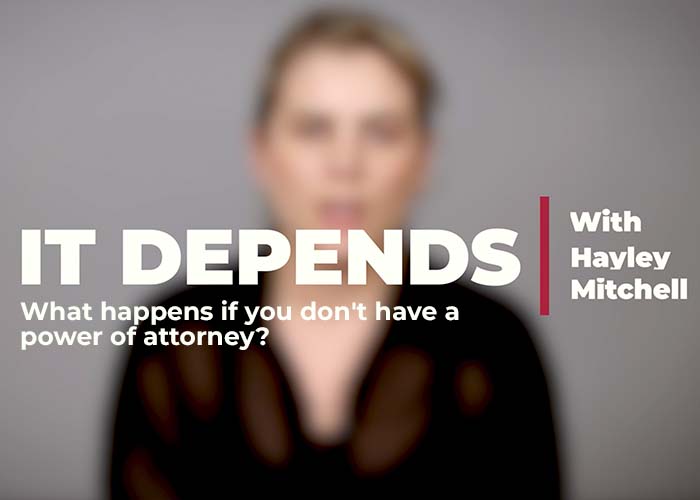Cooper Grace Ward has been announced as the winner of four categories in the latest Beaton Client Choice Awards: Best Australian Law Firm, Best Professional Services Firm, Most Innovative Law ...

In this edition of It depends, partner Hayley Mitchell talks about what happens if someone has lost capacity and they don’t have an enduring power of attorney.
Hi, and welcome to another edition of It depends. Today, I’m going to talk about what happens if someone doesn’t have an enduring power of attorney and they’ve lost capacity.
It’s likely you will need to make an application to the tribunal in your state. Relevantly, in Queensland, it’s the Queensland Civil and Administrative Tribunal. Otherwise referred to as QCAT.
The type of application that you need to make to the tribunal is going to depend on the circumstances. If it is a question of a financial decision needing to be made for a person who has lost capacity, then the relevant application is for the appointment of an administrator. Whereas if it is a personal health decision that needs to be made, it is an application for the appointment of a guardian, or you might be making a combined application for the appointment of both of these positions. If the matter is urgent, you can also seek urgent interim orders from the tribunal. Making an urgent application means that the tribunal will look at the application much more quickly. But the effect of an interim order is it will only last for a three month period.
Yes, the tribunal will require a health professional report to be provided for any of these applications, even if it is an urgent application. The report can be completed by either a treating GP or a specialist doctor.
What the tribunal needs to consider is really going to vary depending on the circumstances of the case, but at a minimum, the tribunal needs to satisfy themselves that the person has impaired capacity. There also needs to be a decision that has to be made for the adult, or a risk to their personal welfare or their property or assets.
The tribunal is designed and set up to be used by the public without necessarily engaging a lawyer. However, this is a fairly complex area of the law, so seeking legal advice prior to making an application is always recommended. Contact a member of our team if you’ve got any questions about this area.
This publication is for information only and is not legal advice. You should obtain advice that is specific to your circumstances and not rely on this publication as legal advice. If there are any issues you would like us to advise you on arising from this publication, please let us know.
Subscribe to our interest lists to receive legal alerts, articles, event invitations and offers.

In this edition of It depends, family partner Justine Woods discusses whether you can safeguard an intergenerational family business from a family law claim. Video Transcript Hello. Hello, everyone. ...
Cooper Grace Ward acknowledges and pays respect to the past, present and future Traditional Custodians and Elders of this nation and the continuation of cultural, spiritual and educational practices of Aboriginal and Torres Strait Islander peoples.
Fast, accurate and flexible entities including companies, self-managed superannuation funds and trusts.